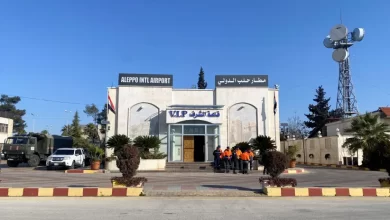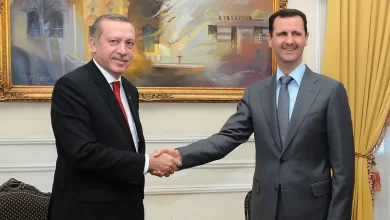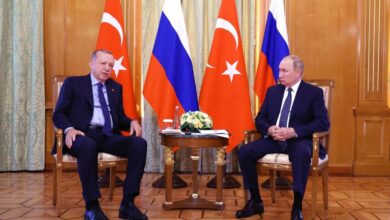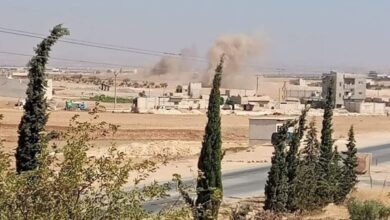Russia says military coordination with Israel in Syria will continue as usual
Embassy says cooperation is daily and ‘useful,’ indicates condemnation over Ukraine invasion won’t influence Syrian arrangement
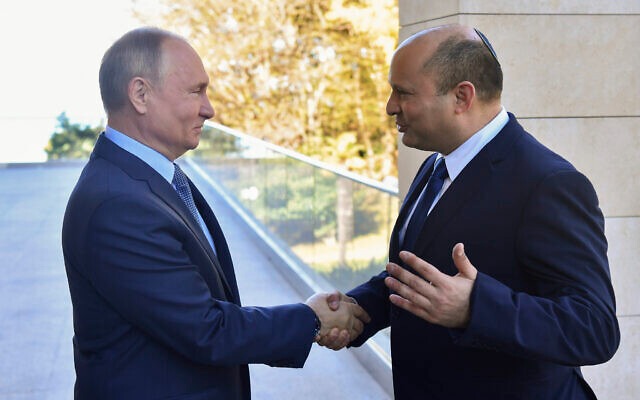
The Russian embassy in Israel said that military coordination with Israel in Syria will continue, even as the two countries spar over Russia’s invasion of Ukraine.
Jerusalem and Moscow have in recent years maintained a so-called deconfliction mechanism that works to prevent Israeli and Russian forces from clashing in Syria. Russia is a main player backing the Syrian government in a grinding civil war, while Israel has waged a years-long campaign of airstrikes aimed at pro-Iranian fighters located there and at preventing the transfer of Iranian-supplied weaponry.
“Our military officials discuss the practical issues of this substantively on a daily basis. This mechanism has proven to be useful and will continue to work,” the Russian embassy said in a statement quoted by Reuters on Saturday.
It also noted that while Moscow supports Israel’s security needs, it opposes violations of Syrian sovereignty.
Israel’s military told Reuters its forces “will act when needed to counter threats, defend the people of Israel and our sovereignty.”
Russia on Friday summoned Israel’s Ambassador to Moscow Alexander Ben Zvi to clarify Israel’s position regarding the Ukraine invasion a day after Foreign Minister Yair Lapid called the incursion a “grave violation of international order.”
As Russia attacks Ukraine, Israel has avoided taking a stance aligned too closely with either side. This is believed to be at least partly due to its need to work with the Russian military presence in neighboring Syria.
Israel has expressed concern regarding the invasion and offered humanitarian aid to the Ukrainian people, but Prime Minister Naftali Bennett has avoided condemning Russia or even mentioning the country by name in his statements since the launching of the widespread military operation across Russia’s border early Thursday morning.
Lapid issued a far more clear criticism in his statement, saying, “Israel condemns the attack, and is ready and prepared to provide humanitarian assistance to the citizens of Ukraine.”
Russia’s ambassador to Israel told The Times of Israel on Friday that Moscow “hope[s] that Israel will continue [taking] a wise diplomatic approach.”
The deconfliction mechanism was discussed by Bennett and Russian President Vladimir Putin when they met for talks in Sochi, Russia, last October. A senior Israel official said after the meeting that they had agreed to continue the arrangement.
There were “very wide” talks regarding the situation in Syria aimed at “safeguarding the coordination mechanism,” said Housing Minister Ze’ev Elkin who accompanied Bennett on the trip, at the time.
Former prime minister Benjamin Netanyahu met Putin on multiple occasions to discuss the issue and claimed that their personal relationship was a main factor in maintaining the mechanism.
Israel has carried out hundreds of airstrikes inside Syria in the course of the country’s civil war, targeting what it says are arms shipments bound for Lebanon’s Iran-backed Hezbollah terror group, which is fighting alongside Syrian government forces. Israel rarely acknowledges or discusses such operations.
Russia meanwhile, is a close ally of Syria’s Bashar Assad, has forces based and operating in Syria, and provides Syria with air defenses that try and shoot down Israeli jets and missiles.
Israeli officials do not generally discuss the full extent of the coordination, but they stress that the IDF does not seek Russian permission before carrying out operations.
The status of the deconfliction hotline has been uncertain since 2018, when a Syrian air defense gunner, aiming for Israeli jets on a bombing run, knocked a Russian military plane out of the sky instead, killing all 15 people on board.
Russia responded by providing Syrian forces with advanced S-300 air defense batteries, which were thought to have the potential to significantly curtail Israel’s freedom of action in the skies over the country.
Moscow maintains state-of-the-art S-400 air defense systems to protect its own assets in Syria, but has never turned them on Israeli planes.
On Thursday, Syrian state media said three Syrian soldiers were killed in an Israeli airstrike near the capital Damascus. The alleged strike came hours after Israel apparently dropped leaflets on Syrian army positions warning that they could be targeted for collaborating with Iran-backed terror group Hezbollah.
timesofisrael

